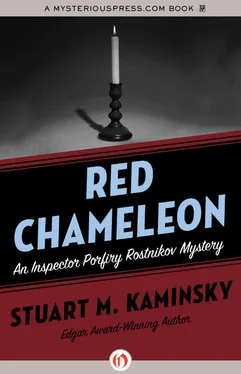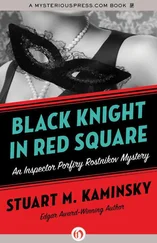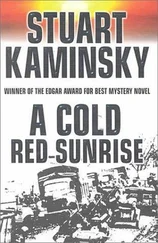Stuart Kaminsky - Red Chameleon
Здесь есть возможность читать онлайн «Stuart Kaminsky - Red Chameleon» весь текст электронной книги совершенно бесплатно (целиком полную версию без сокращений). В некоторых случаях можно слушать аудио, скачать через торрент в формате fb2 и присутствует краткое содержание. Год выпуска: 2012, ISBN: 2012, Издательство: MysteriousPress.com/Open Road, Жанр: Полицейский детектив, на английском языке. Описание произведения, (предисловие) а так же отзывы посетителей доступны на портале библиотеки ЛибКат.
- Название:Red Chameleon
- Автор:
- Издательство:MysteriousPress.com/Open Road
- Жанр:
- Год:2012
- ISBN:978-1-4532-6632-8
- Рейтинг книги:4 / 5. Голосов: 1
-
Избранное:Добавить в избранное
- Отзывы:
-
Ваша оценка:
- 80
- 1
- 2
- 3
- 4
- 5
Red Chameleon: краткое содержание, описание и аннотация
Предлагаем к чтению аннотацию, описание, краткое содержание или предисловие (зависит от того, что написал сам автор книги «Red Chameleon»). Если вы не нашли необходимую информацию о книге — напишите в комментариях, мы постараемся отыскать её.
Red Chameleon — читать онлайн бесплатно полную книгу (весь текст) целиком
Ниже представлен текст книги, разбитый по страницам. Система сохранения места последней прочитанной страницы, позволяет с удобством читать онлайн бесплатно книгу «Red Chameleon», без необходимости каждый раз заново искать на чём Вы остановились. Поставьте закладку, и сможете в любой момент перейти на страницу, на которой закончили чтение.
Интервал:
Закладка:
First Stefan had been killed. They had told her it was an accident, but it had been no accident. It had been the first step in the conspiracy against her, a conspiracy by the state, the KGB, the police. She knew the reason, too. The steroids. They had urged her to take those steroids for competition and to prepare her for the Olympics. Now, even twenty years later, they were still warning her to keep her quiet, to keep her from creating an international scandal that might ruin the reputation of the Soviet athletic system. They had, of course, lied to her. One doctor had said she needed psychiatric help, but it was not a psychiatrist she needed; besides, the state didn’t believe in psychoanalysis.
No, there was no one to trust. First it had been Stefan they had pushed in front of the metro at the Kurskaya station. Then her father had been murdered. They had said it was a heart attack, that he was seventy-eight years old, drank too much, smoked too much, but she knew the truth. One by one, as a warning to her, they had murdered people she knew. Sometimes they were very subtle. Nikolai Repin, whom she had gone to school with, was dead of some unknown cause. She was told this by another old acquaintance she happened to meet in front of the National Restaurant on Gorky Street. Vera had not seen Nikolai for at least ten years, but this woman, whose name she could not recall, had happened to meet her, had happened to mention his death. Vera was no fool. The meeting had not been by chance. It had been planned, another warning. She had been careful, so careful not to let them know, not to let her mother know of the conspiracy around her. Vera knew they were trying to poison the air in her small apartment, and so for years she had set up a tent in her room, a tent of blankets held up by chairs and the kitchen table. There was ample air under the blanket for the night, though there was always the slight smell of poison in the room each morning, and in the summer it had been almost unbearably hot under the blanket. Her mother had survived miraculously, probably because she had grown immune to the poison. Luck.
Vera had checked her food carefully for years, feeding a bit to Gorki, her cat, before she ate it. She never ate out where they could slip something in.
And then they had gotten through her defenses. Vera wasn’t sure how they had done it, probably through special rays in the wall. It didn’t matter. They had done it. For almost a year she had kept quiet about the pains in her stomach. Once in a hospital, she was sure they would simply cut her open, remove the remnants of the steroids, and let her die, stomach open, no one caring. They would stuff a rag in her mouth and wheel her into the corner to die, possibly shunt her body into a little closet. They didn’t care. She had no use, no value. Then they had finally gotten her into a hospital when she collapsed at the box factory where she worked. The doctor who examined her said Vera had stomach cancer. Vera did not weep. No one would see her weep. They all looked at her with curiosity, as if she were some specimen, some experiment that had gone wrong and now would not quietly die so she could be swept into the garbage.
The doctor had recommended surgery, but Vera had declined. The doctor had not seemed to care. No one seemed to care about Vera. As far as they were concerned, she was already dead, taken care of, gone, swept into the garbage. But they were wrong. They had killed her, but they had made the mistake of not finishing the job.
The Moisin rifle had been her father’s in the war. It was too large, too awkward, and she wasn’t sure the rifle would work. The bullets were so old. Her father had sometimes taken her hunting when she was a child, and she had been a natural shooter. The idea was simple. She would pay them back, make them realize what they had done. Those people who walked past her, unsmiling, uncaring. She had become a pawn of the state and then had been cast out, and they had been reasonable, all of them who walked past and didn’t care what the old men who ran the country did to innocent people like Vera. If she could, she would put a bullet into every solid Soviet face in Moscow, but what she wanted most was to destroy the authorities who conspired against her-police, KGB, the military.
She wept with fury each time she climbed a hotel roof, her rifle hidden in that idiotic trombone case. She had avoided elevators and made the painful trek upward through stairways, fire escapes. And then the rifle, the damned rifle, always had something wrong with it. She had now shot five people. That she knew, but she had no idea of whether she had killed them or not. The newspapers never carried stories on such things. But she knew she had hit them. She had watched them go down. She wanted them dead. They had expected her to be dead in a few months, but it was they who had died first. Each shot was justice.
She could have leaped out that night and killed the porter, but she could not count on her stomach to allow her to make the run. In addition, had she thrown him to the street, someone below might have realized where the shots originated, and the police might come after her, catch her before she was finished.
“What are you doing, Verochka?” her mother called across the room. The old woman was embroidering near the window to catch the sun before it was gone.
Vera had told her mother nothing of the cancer, nothing of her frustration, her anger, her fear.
“Thinking,” Vera said.
“Thinking,” her mother repeated.
The two were a contrast. The mother, a small round creature with scraggly white hair and thick glasses, the daughter, massive, with a severe pink face and brown hair tied back with hairpins. Vera was more like her father, at least her father when he had been younger.
“Thinking about people,” Vera said.
Her mother shrugged, not wanting to pursue the thoughts of the daughter she had long ago given up as mad. There was no recourse, no treatment, for the mad in Moscow other than to lock them up. Vera could still work, though she had begun to look pale and had talked less and less each day. Adriana Shepovik was well aware of her daughter’s obsession with the old rifle, but she didn’t question it. The thing certainly didn’t work. The girl had probably been trying from time to time to sell the gun, though Adriana doubted if anyone would buy the piece of junk.
“I’m going out,” Vera said, suddenly getting up.
“Eat something.”
“I’ll eat when I get back,” Vera said, reaching down to pet Gorki, who had rubbed against her leg.
Vera went to the closet near the door and reached behind the heavy curtain for the trombone case. She kept her back to the old woman, though she doubted if the woman could see that far.
“I may be home late,” Vera said.
Her mother grunted and plunged the needle into the orange material on her lap.
“Very late,” Vera repeated, opening the front door and stepping out.
It was possible, Vera thought, that she might not return all night. She was determined this time not to be impatient. The pain in her stomach was growing each day, and the medicine she had been given had helped less and less. The day might come soon when Vera would not be able to go out, climb to the roofs of Moscow, and find justice.
No, tonight she would wait patiently even if it took till dawn. She would wait until she could get a good shot at a policeman.
The electrichka had been fast and not particularly crowded. It had been an off hour for travel, around ten when Rostnikov and Zelach left. The ride to Yekteraslav took about an hour, during which Zelach tried to carry on a conversation while Rostnikov grunted and attempted to read his Ed McBain book.
There was no stop at Yekteraslav. They had to get off at Sdminkov. When they left the train, Rostnikov’s left leg was almost totally numb. A taxi stood near the station, and Rostnikov limped toward it, with Zelach in front.
Читать дальшеИнтервал:
Закладка:
Похожие книги на «Red Chameleon»
Представляем Вашему вниманию похожие книги на «Red Chameleon» списком для выбора. Мы отобрали схожую по названию и смыслу литературу в надежде предоставить читателям больше вариантов отыскать новые, интересные, ещё непрочитанные произведения.
Обсуждение, отзывы о книге «Red Chameleon» и просто собственные мнения читателей. Оставьте ваши комментарии, напишите, что Вы думаете о произведении, его смысле или главных героях. Укажите что конкретно понравилось, а что нет, и почему Вы так считаете.












